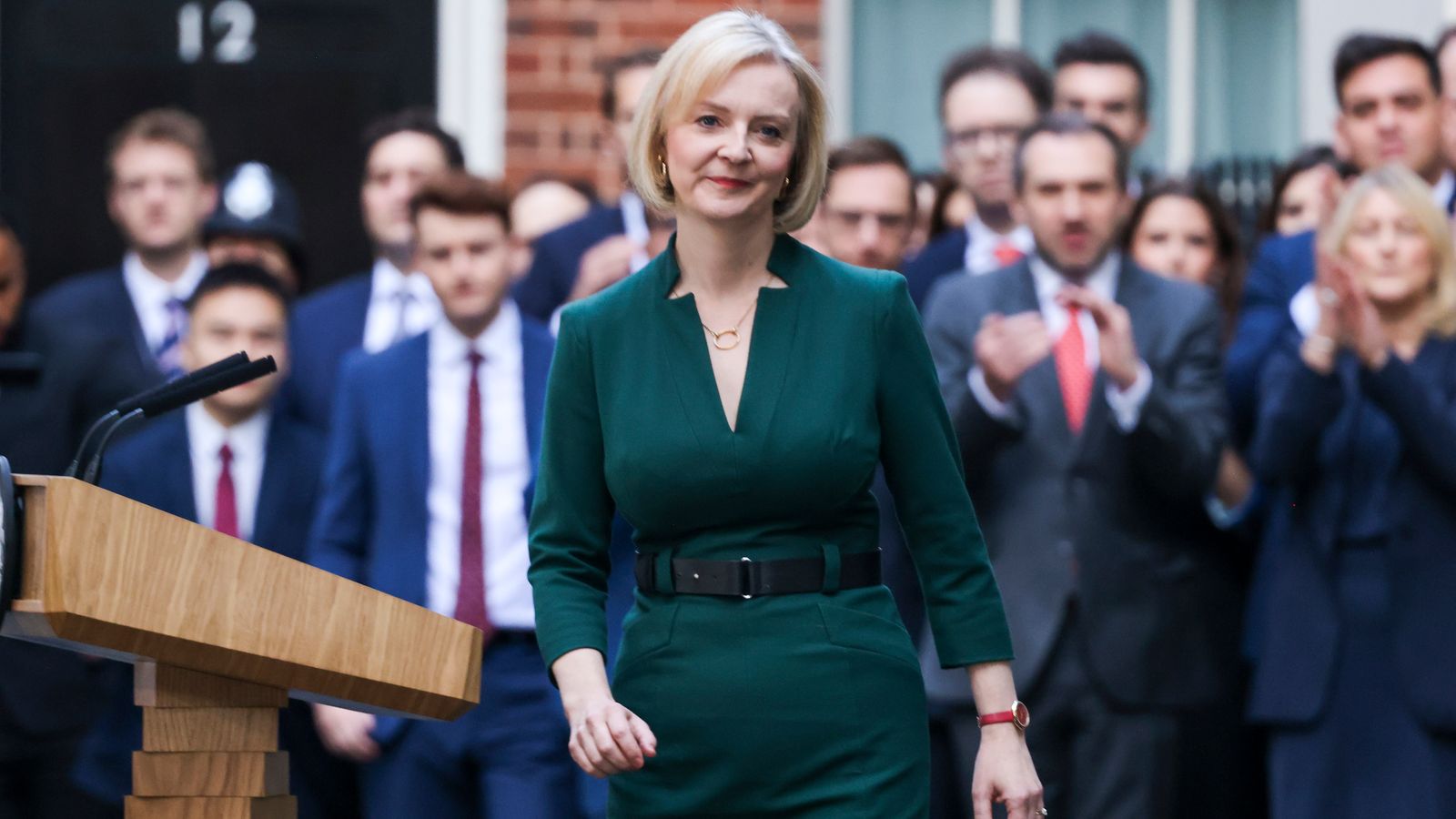‘I know brighter days lie ahead’: Liz Truss bids farewell to Downing Street

Liz Truss has insisted “brighter days lie ahead” for the country as she gave her final speech before leaving Number 10.
Speaking outside Downing Street, Ms Truss, who has become the UK’s shortest serving prime minister after just seven weeks, wished Rishi Sunak “every success” as he takes the reins.
But she appeared to double down on her political philosophy, saying “Brexit freedoms” should allow taxes to be lower, and adding: “We simply cannot afford to be a low growth country”.
New PM – latest updates from Downing Street
“I am more convinced than ever that we need to be bold and confront the challenges that we face,” she said.
“As the Roman philosopher Seneca wrote, it’s not because things are difficult that we do not dare it is because we do not dare that they are difficult.”
Ms Truss went to Buckingham Palace to officially offer her resignation to the King.
Just before 11am, the Royal Household confirmed the event had taken place and that King Charles was “graciously pleased to accept”.
The new leader of the Conservative Party, Mr Sunak, then met the King and was asked to form a new government.
Advertisement
In her speech, Ms Truss claimed her short administration had “acted urgently and decisively on the side of hard working families and businesses” by reversing the rise in National Insurance and introducing help with energy bills over the winter.
But there was no apology after the economic chaos of recent weeks following her tax cutting mini-budget that ultimately led to her downfall.
Instead, she said that she planned to stay in politics, “spending more time in my constituency and continuing to serve South West Norfolk from the backbenches”, before echoing the speech she made on entering Downing Street.
“Our country continues to battle through a storm, but I believe in Britain,” she said. “I believe in the British people and I know that brighter days lie ahead.”
Liz Truss’s speech departing Downing Street was only slightly more memorable than the one she delivered on arrival.
With such an insubstantial legacy, she was forced to focus on her principles, rather than her achievements.
Ms Truss returned to her insistence that the UK “cannot afford to be a low growth country”, her belief in lower taxes, and also said: “Ukraine must prevail”.
She seemed to be attempting to argue that it was her boldness that brought her down – critics would argue it was a dangerous and irresponsible lack of political caution.
With echoes of Boris Johnson, Ms Truss quoted the Roman philosopher Seneca, saying: “It is not because things are difficult that we do not dare. It is because we do not dare that they are difficult.”
These Downing Street farewells are by their very nature laced with failure, but today there was no real acknowledgment of the disastrous nature of Ms Truss’s premiership.
In the three minute six second address, she did not apologise or show regret for the economic mess she has left for her successor, or indeed for millions of people across the country.
Instead she seemed to be offering advice to Mr Sunak – that he should be radical in delivering Brexit and changing the economic landscape of the UK.
Like Gordon Brown in 2010 and David Cameron in 2016, the Truss children (Frances, 16, and Liberty, 13) watched their mother speak outside Number 10 and joined her in meeting the monarch at Buckingham Palace.
Liz Truss said she will now be spending more time in her Norfolk constituency – a clear sign she is not expecting a role in Rishi Sunak’s cabinet.
Reports suggests she intends to “take a break” from frontline politics, but that of course is hardly her choice. Ms Truss toxic reputation means future prime ministers are unlikely to want her anywhere near their top teams.
Ms Truss won the keys to Number 10 at the start of September after a summer-long leadership contest to replace Boris Johnson.
She beat Mr Sunak with 57% of the votes from party members and promised them she would “deliver, deliver, deliver”.
The start of her premiership was dominated by the death of the Queen, and she her attended tribute events across the country to support the new King and gave a reading at the funeral.
But her time in office was defined by the mini-budget that sent markets into turmoil and the pound tumbling.
Please use Chrome browser for a more accessible video player
3:46
As Liz Truss resigns as prime minister, we take a look back on her political journey.
Ms Truss tried to regain her authority by firing her Chancellor Kwasi Kwarteng and replacing him with Jeremy Hunt, who within days had reversed nearly all her policies.
But after the resignation of her home secretary and chaos in parliament over a vote on fracking, she said she accepted she could no longer stay in post.
Mr Sunak was chosen to replace her by Tory MPs four days later.